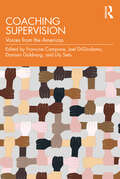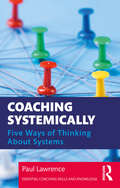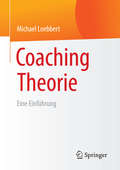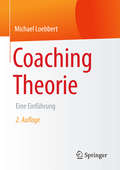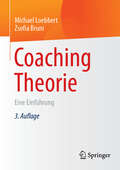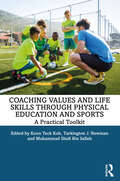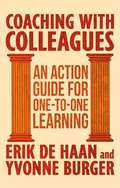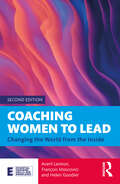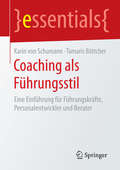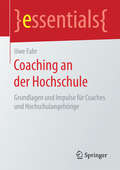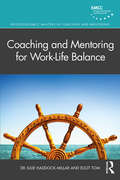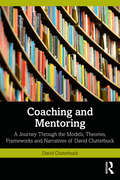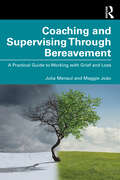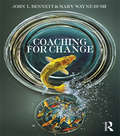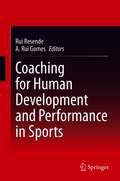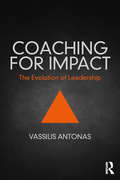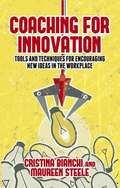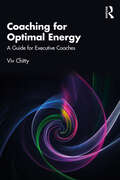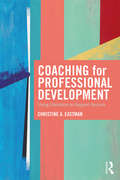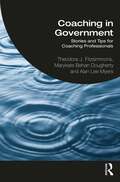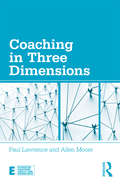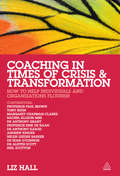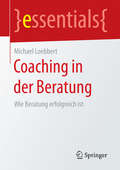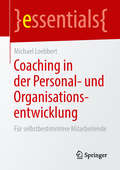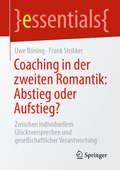- Table View
- List View
Coaching Supervision: Voices from the Americas
by Francine Campone Joel DiGirolamo Damian Goldvarg Lily SetoThis edited collection brings together an impressive and international array of coaching supervisors to highlight the unique cultural and contextual aspects of coaching supervision in the Americas, exploring current theory, research, and practice. Offering fresh insights into a growing field, Francine Campone, Joel DiGirolamo, Damian Goldvarg, and Lily Seto expertly present the nuances of coaching supervision principles and practices in the Americas. The book is organized into three parts. Part 1 introduces the range of cultures and values that inform approaches to and beliefs about coaching supervision in the Americas, such as racial justice, working with indigenous communities, and providing culturally sensitive coaching supervision. Part 2 presents adaptations of coaching supervision models and methods to align with Americas contexts, as well as uniquely introducing an original model for coaching supervision rooted in an Americas perspective. Incorporating theory with practitioner’s experiences throughout, Part 3 presents chapters that offers avenues for increasing awareness and interest in coaching supervision in the Americas, including chapters on coach wellbeing and the developmental journey of the coach. Coaching supervisors work across borders and boundaries, and this book will extend supervisors’ understanding of the various contexts in which they are working. It is essential reading for coaching supervisors, educators, trainers, mentors, and coaches, and it will be of interest to practitioners and graduate students in organizational development and those who oversee internal coaching programs.
Coaching Systemically: Five Ways of Thinking About Systems (Essential Coaching Skills and Knowledge)
by Paul LawrenceThis book provides an accessible and clear description of key theories of systemic coaching and how they can be applied to coaching practice. Structured around five different ways of thinking about systems, the book provides coaches with a high-level overview of different systems theories and how those theories may be applied in practice. Readers are invited to consider each of the five different ways of thinking through the lens of philosophy, purpose and practice: Which theories most resonate for you? How do these systemic perspectives shape your purpose for coaching, and how do they show up in the way that you coach? With examples and case material throughout, Coaching Systemically aligns coaching with the realities and challenges of organisations operating in an ever more complex world. Readers will walk away from the book with a clearer understanding of what it means to coach ‘systemically’ and new ideas as to how they can translate insights into practice. Coaching Systemically will be key reading for coaches in practice and in training, consultants and anyone interesting in systemic approaches.
Coaching Theorie: Eine Einführung
by Michael LoebbertDieses Buch räumt das herrschende Durcheinander von Ansätzen und Perspektiven im Coaching systematisch auf. Coaches, die auf Augenhöhe arbeiten, können ihren Klienten und Kunden darstellen, was sie wie und warum anbieten und tun. Im Kontext beraterischer Handlungstheorie erweist sich Vieles als haltbar: Lösungs- und Ressourcenorientierung, systemische Interventionsgestaltung, Prozessberatung, narratives Coaching, psychodynamische Ansätze, Coaching als Dienstleistung. Dieses Buch bündelt die Vielzahl an Ansätzen und trägt zur weiteren Entwicklung von Coaching-Praxis, -Weiterbildung und -Forschung bei.
Coaching Theorie: Eine Einführung
by Michael LoebbertDieses Buch räumt das herrschende Durcheinander von Ansätzen und Perspektiven im Coaching systematisch auf. Coaches, die auf Augenhöhe arbeiten, können ihren Klienten und Kunden darstellen, was sie wie und warum anbieten und tun. Im Kontext beraterischer Handlungstheorie erweist sich Vieles als haltbar: Lösungs- und Ressourcenorientierung, systemische Interventionsgestaltung, Prozessberatung, narratives Coaching, psychodynamische Ansätze, Coaching als Dienstleistung. Dieses Buch bündelt die Vielzahl an Ansätzen und trägt zur weiteren Entwicklung von Coaching-Praxis, -Weiterbildung und -Forschung bei.
Coaching Theorie: Eine Einführung
by Michael Loebbert Zsofia BruniCoaching als Praxislehre braucht eine systematische theoretische Fundierung. Herkömmliche Kunstlehren sind darin integriert und begrenzt. Treiber dieser Entwicklung sind Coaching Forschung und die akademische Weiterbildung von Coaches. Es geht um die Vergewisserung über den Gegenstand. - Was Coaches und Beratungspersonen wissen sollten. Forschende, Studierende, Weiterbildungsteilnehmernde, Praktiker*nnen und auch Coachinglehrende brauchen ein inhaltliches Verständnis von Coaching: Was ist Coaching? Worin unterscheidet sich Coaching von anderen Beratungsformen oder auch Therapie und Training? Was sind die zentralen Konzepte? Welche Perspektiven ergeben sich daraus für Forschung, Weiterbildung und Praxis? Welche Grenzen und Übergänge einer Coaching Theorie im Verhältnis zu anderen Praxiswissenschaften werden dadurch deutlich? In der dritten Auflage finden Sie weitere Ergänzungen wie z.B. Coaching als Kommunikation, digitale Medien im Coaching und den Ausblick auf den Abschluss einer Coaching Theorie in der Weiterentwicklung von Praxiswissenschaften wie Erziehungs-, Beratungs- und Managementwissenschaft.
Coaching Values and Life Skills through Physical Education and Sports: A Practical Toolkit
by Koon Teck Koh Tarkington J Newman Muhammad Shufi Bin SallehThis impactful resource guide is for international educators and practitioners involved in Physical Education and Sport (PES) who want to learn evidence-based approaches to the teaching of values and character education. Through a systematic approach to teaching and evaluating values and character education, this book bridges the gap between theory and practice. It offers empirical evidence and strategies to show how values and character can be internalized, through carefully designed experiences, active participation, and regular reinforcement, without compromising the time needed to learn sports skills - a common concern raised by PE teachers and sports coaches. Results from case studies have also revealed that values can be transferred beyond the context of physical education lessons and sports through a collaborative approach and effective communication between teachers, coaches, and parents. Key strategies based on empirical evidence are highlighted in this book. It also highlights an Asian perspective on values and life skills training through Physical Education and provides readers with step-by-step implementation guidelines to simplify some complex strategies in developing values and life skills through PES seamlessly.The book provides useful information to anyone engaged in developing young people in, and through, sport. In particular it will be of great value to pre-service and in-service teachers and coaches for implementing effective strategies to balance teaching sports skills, values, and life skills effectively in PES.
Coaching With Colleagues
by Erik De Haan Yvonne BurgerThis is the first serious, rigorous book about coaching which is deeply rooted in a long and varied therapeutical tradition and at the same time translates insights from that tradition into clear and crisp models for practical application in modern coaching practice. The book refers to well-known coaching approaches in business and devotes more attention than usual to internal coaching practices. It is a distinct, rigorous yet accessible guide to coaching approaches and practice.
Coaching Women to Lead: Changing the World from the Inside (Essential Coaching Skills and Knowledge)
by Averil Leimon François Moscovici Helen GoodierTen years ago, the first edition of this book asked why there was such a low number of women filling leadership roles and outlined what it took for women to succeed in their careers. Since then, headline numbers have gone up but has there been real change? This new edition continues a deep investigation into underlying issues and coaching responses. Building on the first edition’s original research with the London School of Economics, the authors revisit all assumptions, adding millennials and beyond, as well as a broader selection of industry sectors. In this book, you will find: How to build a business case for coaching women specific to your organisation. Which areas of coaching are the most useful at which stage of long careers – not just age. Refreshed interviews with past and new women leaders. Specific tools and techniques to develop women leaders and build more women-friendly organisations. The original research clearly stands, so do the core elements of coaching that lead to success. This book will be of great interest to coaches, women leaders, professional managers and academics.
Coaching als Führungsstil: Eine Einführung für Führungskräfte, Personalentwickler und Berater (essentials)
by Karin Schumann Tamaris BöttcherIn diesem essential lernt der Leser die Kompetenzanforderungen an eine coachende Führungskraft kennen und kann sich mit den zentralen Coachinginstrumenten vertraut machen. Es wird darauf geachtet, den Anspruch an die coachende Führungskraft realistisch zu formulieren und diese Rolle positiv zu belegen. Coaching als Führungsstil wird sowohl wissenschaftlich fundiert als auch praxis- und anwendungsorientiert dargestellt. Die Kombination aus aktuellsten wissenschaftlichen Bezügen und einer über 20-jährigen Coaching- und Beratungspraxis charakterisieren das Autorinnenteam und das Buch.
Coaching an der Hochschule: Grundlagen und Impulse für Coaches und Hochschulangehörige (essentials)
by Uwe FahrUwe Fahr gibt in diesem essential einen #65533;berblick dar#65533;ber, welchen Bedarf an Coaching Forschende und Lehrende an Hochschulen haben. Er zeigt aus der Perspektive eines Coaches auf, vor welchen Herausforderungen dieser Personenkreis steht und was es bedeutet, an einer deutschen Hochschule zu arbeiten. Praxisorientiert zeigt der Autor auf, was Coaching f#65533;r diesen Personenkreis leisten kann. Coaches erhalten Hintergrundwissen zum Coaching im Hochschulkontext.
Coaching and Mentoring for Work-Life Balance (Routledge EMCC Masters in Coaching and Mentoring)
by Julie Haddock-Millar Eliot TomThe coaching and mentoring profession is facing a major challenge – helping clients cope effectively with life’s complexities and conflicting demands in a rapidly changing environment. Conversations around work-life balance need to address not only the interconnectedness of work, leisure, home, and social life but also the fact that these elements are in flux and require continuous rebalancing. This book is a practical and evidence-based resource to help coaches and mentors in supporting clients to achieve greater work-life balance. Written by an experienced academic-practitioner team, this book provides coaches and mentors with a way of addressing work-life tensions with their clients. It is grounded in research and practice and offers a wide range of tools and techniques which are supported with real-life case studies illustrating how they can be employed. On top of this, readers are also supported with reflective questions to enhance understanding and a series of downloadable worksheets for practical use. Coaching and Mentoring for Work-Life Balance is essential reading for professional coaches and mentors who are helping their clients to develop personal resilience and will also be a valuable resource for students in postgraduate coaching and mentoring courses. The authors present some of the latest thinking on this topic, underpinned by their own research and model for work-life balance, making the book indispensable to all those engaged in leadership, coaching, mentoring, and supervision.
Coaching and Mentoring: A Journey Through the Models, Theories, Frameworks and Narratives of David Clutterbuck
by David ClutterbuckThis book represents both a milestone and a celebration. It brings together in one place all the theories and models that have emerged from the work of David Clutterbuck, one of the last surviving, first pioneers of coaching and mentoring, who has significantly helped to shape the field; and is published as his 75th book at age 75. Many of the models and approaches familiar to coaches and mentors are based in David’s prolific research, writing and practice, from Systemic Talent Management, through Team Coaching from a Complex, Adaptive Systems perspective, Personal Reflective Space, to the Diversity Awareness Ladder. In bringing more than 60 of these innovations into one volume, the book provides an invaluable contribution to the practice of coaching, and puts the evolution of coaching theory into context, tracing its development over time. This book is a one-stop-shop for coach practitioners and students to get up to speed and understand these foundational models. This book will appeal to coaches and HR professionals across the world, at all levels.
Coaching and Supervising Through Bereavement: A Practical Guide to Working with Grief and Loss
by Julia Menaul Maggie JoãoThis book presents a pragmatic guide for coaches and supervisors working with grief and bereavement, providing both useful case studies and practical techniques to aid professionals in embracing the complexity of working with these topics in a coaching context. Coaching and Supervising Through Bereavement clearly delineates the boundary between bereavement issues requiring specialist counselling and 'normal' bereavement topics within coaching. It addresses how to coach clients through all different forms of bereavement, not just through death but also other losses such as job loss and relationship loss, and enables coaches to shine a light on their own bereavement journeys for the benefits of themselves and their clients. The authors also offer a guide for coaching supervisors to aid the ethical and emotional support required for their own supervisees and themselves. This book debunks the myth that bereavement should not be discussed in coaching, and so will be a valuable resource for any practicing coach or supervisor of all levels of experience or expertise.
Coaching for Change
by John L. Bennett Mary Wayne BushCurrent research indicates that approximately 70% of all organizational change initiatives fail. This includes mergers and acquisitions, introductions of new technologies, and changes in business processes. Leadership is critical in initiating, driving and sustaining change to produce business results, and executive coaching is the best way to support leaders at all levels. Coaching for Change introduces a model for executive coaching that provides the tools and resources to support leaders in driving organization change. In this book, a number of coaching and change models are explored with the goal of integrating them into a framework that can be applied to the individual, team or organization. Bennett and Bush explain the theories behind both coaching and change, and include practical sections on developing coaching skills. A companion website supports this book as a learning tool, featuring a curriculum, instructor guides, powerpoint presentations and more. Coaching for Change is a valuable book for students in coaching, change management or organizational development courses, as well as professionals who want to develop their skills to drive successful change within their organizations.
Coaching for Human Development and Performance in Sports
by Rui Resende A. Rui GomesThis book addresses important topics of coaching in order to better understand what sports coaching is and the challenges that arise when assuming this activity. It provides the reader with useful insights to the field of sports coaching, and discusses topics such as coaching education, areas of intervention, and main challenges. With contributions by experts and well-known authors in the field, this volume presents an up-to-date picture of the scholarship in the coaching field. It introduces key aspects on the future of the science of coaching and provides coach educators, researchers, faculty, and students with new perspectives on topics within the field to help improve their coaching effectiveness.
Coaching for Impact: The Evolution of Leadership
by Vassilis AntonasThe world is changing. The first century of the third millennium has seen exponential growth and advancement in almost all areas, and makes the last century of the second millennium look like a rusty old steam train by comparison. The ‘digital revolution’ is no longer a revolution. Practically anyone can publicise their outlook, whilst having access to a wealth of information at the click of a button. And this levels out the playing field in an unprecedented and unpredictable way. So how can anyone stand out? How can anyone gain a competitive advantage? How can anyone master more influence? How can anyone lead? The answer lies in coaching: a discipline that enhances performance by generating meaning through the art of relating. In Coaching for Impact, Vassilis Antonas brings together his dual expertise in executive coaching and psychotherapy to present a transformative, evolutionary approach. The book examines methodology, presence and fundamental skills and includes a new, innovative model of leadership. Antonas also uses Jungian concepts to address the coach’s internal disposition, supporting their evolution and transformation. Coaching for Impact equips trainee and beginner coaches with an A to Z of executive coaching and engages seasoned practitioners to an uncompromised pursuit of excellence by pushing the boundaries of leadership coaching. It will appeal to executive and leadership coaches at all levels, including those in training.
Coaching for Innovation
by Cristina Bianchi Maureen SteeleMaking innovation in the workplace highly accessible, Coaching for Innovation presents a step-by-step guide which is full of practical tips, models, exercises and interviews with HR and business professionals. It demonstrates the integral role that coaching plays in idea generation and the innovation process.
Coaching for Optimal Energy: A Guide for Executive Coaches
by Viv ChittyA completely new way of considering energy in executive coaching, the concept of ‘optimal energy’ is based on original research. This fresh insight and its application is a fundamental new approach for use in executive coaching. Suboptimal energy levels in senior executives, although rarely considered, can negatively impact efficacy, feelings, behaviour and self-awareness both at work and in coaching sessions. But what is optimal energy? This needs to be addressed by executive coaches, but how? Coaching for Optimal Energy: A Guide for Executive Coaches answers these questions and challenges previous thinking on the subject. Written for executive coaches, and appropriate for anyone who works with people, for the first time in coaching literature the book gives a research-based definition of the concept of energy and examines how energy manifests in clients, analyses the influences on energy and offers clear guidance and practical ideas for addressing energy with clients. This is an essential new resource for coaches and other practitioners who want to effectively address energy and enable clients to take action to optimise their energy in their daily lives.
Coaching for Professional Development: Using literature to support success
by Christine A. EastmanCoaching has emerged as one of the most significant aids in developing managers and executives in the professional world. Yet there is a degree of dissatisfaction with performance coaching models and a desire to connect more with creativity and the imagination. In Coaching for Professional Development: Using Literature to Support Success, Christine A. Eastman suggests that literary works have a part to play in bringing about a change in coaching culture. Using a series of examples from key literary texts, she argues that literature can help coaches enhance their skills, find solutions to workplace problems, and better articulate their own ideas through innovation and imagination. Eastman argues for literature as a coaching tool, detailing how using stories of loss, failure, alienation and human suffering in a coaching dialogue bring positive results to organisational coaching. Coaching for Professional Development considers how reading fiction helps us to imagine lives outside our own, and how this sensitivity of language brings out the unconscious within us and others. Eastman discusses how she guided her students to embrace literature as a positive influence on their coaching practice through literary texts. Chapter 1 begins by exploring how reading Melville’s Bartleby the Scrivener allowed her students to understand the importance of metaphor in their own coaching, with Chapter 2 illuminating how Cather’s Neighbor Rosicky addresses the role of emotion. After this, Eastman considers how John Cheever’s multi-layered story The Swimmer provides rich stimulus for coaching students in understanding failure, how Miller’s Death of a Salesman shows how our family relationships are reflected in our office dynamics, and how the reactions of her students engaging with Lampedusa’s The Leopard are more effective than the traditional coaching tool, Personalisis, in revealing their personality. She finally looks at Shakespeare’s The Tempest for exploring themes of power and manipulation in a coaching context. By applying coaching models to fictional scenarios, Eastman demonstrates that coaches, HR professionals and students can successfully extend the boundaries of their coaching, strengthen their interventions and enhance their understanding of theory. Coaching for Professional Development: Using Literature to Support Success is a unique approach to coaching with engaging case studies throughout that brings together higher education and industry. It will be key reading for coaches in practice and in training who wish to enhance creativity in their work, advisors and teachers on coaching courses, and HR and L&D professionals working in organizations seeking to implement a coaching culture.
Coaching in Government: Stories and Tips for Coaching Professionals
by Theodora J. Fitzsimmons Marykate Behan Dougherty Alan Lee MyersThis book captures the story of how internal coaching was introduced and has since evolved in the U.S. Federal Government. It provides coaches and government agency leaders with skills and tools to help them implement their own successful coaching programs. Written by leaders in the field, the book follows the stories of several pioneers who have implemented coaching programs in government, aiming to help coaches learn from their mistakes and gain from their wisdom. Filled with interviews, case studies, reflective questions, and how-to action points, each chapter accessibly highlights the successes and failures of each program's journey so that professionals can incorporate these lessons in their own practice. Chapters take readers from the beginning considerations to contemplating the future of their programs, focusing on setting a vision, overcoming issues and challenges, leveraging predictors of success, making key decisions, building foundations for sustainability, and creating continuing education for sustainment of change. Accessible and relatable, these stories will help professionals learn from those that have come before them, helping them begin the groundswell of change effectively and proactively in their own programs. This book is essential reading for coaches and government agency leaders, as well as for any public sector agency and any private sector organization that is interested in implementing coaching.
Coaching in Three Dimensions: Meeting the Challenges of a Complex World (Essential Coaching Skills and Knowledge)
by Paul Lawrence Allen MooreTraditional approaches to coaching fail to account for the way organizations really work. Attempts to enhance leadership capability one person at a time, through private one-to-one coaching sessions, are unlikely to succeed by themselves. Coaching in Three Dimensions: Meeting the Challenges of a Complex World offers a more connected, systemic approach, aligning coaching with the realities and challenges of organizations operating in an ever more complex world. Coaching in Three Dimensions is structured around a central model: the three dimensions of coaching. Using stories and case studies, the book enables readers to: Consider their current and desired approach to coaching: is it traditional, dialogic, or systemic? Identify which areas of practice they work in and wish to work in: one-to-one coaching, group/team coaching, and/or organizational coaching? Think about stretching their development as a coach in terms of competence, capability, and perspective: how do you enhance your capacity to manage the challenges of increasing complexity? The book explains complexity using simple language and easy-to-recognize examples, and suggests pragmatic approaches going forwards. Coaches will learn how to expand their scope and impact, and to navigate the new and difficult challenges posed by contemporary businesses. Clients wishing to use coaching in complex change work will learn what to look out for in prospective coaches and how to best deploy them in their organizations. Coaching in Three Dimensions will appeal greatly to all coaches, including those working with organisations, students and those in training, as well as HR and OD professionals and senior leaders.
Coaching in Times of Crisis and Transformation
by Liz HallCoaching in Times of Crisis and Transformation takes an in-depth look at crisis and change in the world we live in today and discusses its impact on both individuals and organizations. Covering not just coaching in the current crisis but any time of crisis and change, it offers a complete, practical resource for managers and coaches to tackle the challenges effectively. This book can help turn a crisis, whether personal or systemic into an opportunity for transformation. Coaching in Times of Crisis and Transformation covers definitions of crisis from both the individual and organizational perspective, including insights on: adapting to change and finding opportunities in crisis, what neuroscience tells us about our reactions to change, transformative coaching, change models, supporting organizations in crisis and how coaching and mentoring can act as preventative measures against crises.
Coaching in der Beratung: Wie Beratung erfolgreich ist (essentials)
by Michael LoebbertMichael Loebbert gibt in diesem essential eine kompakte Einf#65533;hrung in das Verh#65533;ltnis von Coaching und Beratung. Formen und Fragestellungen von Coaching und Supervision f#65533;r Beratung werden systematisch dazu in Beziehung gesetzt. Zudem gibt der Autor einen Ausblick auf die Zukunft des Beratens. Coaching ist darin sowohl Erg#65533;nzung als auch Innovation herk#65533;mmlicher Vorstellungen von Beratung.
Coaching in der Personal- und Organisationsentwicklung: Für selbstbestimmtere Mitarbeitende (essentials)
by Michael LoebbertMichael Loebbert gibt in diesem essential einen Überblick darüber, wie Coaching in der Personal- und Organisationsentwicklung eingeführt und genutzt werden kann. Der Autor stellt Vorgehensweisen und Konzepte dar und weist auf Hürden sowie Risiken hin. Das traditionelle Verhältnis von Person und Organisation in der Arbeitswelt verändert sich. Personal- und Organisationsentwicklung als unternehmerische Funktion – den Mitarbeitenden die für sie passenden Arbeitsbedingungen zu schaffen – braucht und ist immer mehr Coaching. Coaching-Angebote, Coaching-Programme und die Verzahnung mit organisationalen Leistungsprozessen rücken deshalb in den Mittelpunkt moderner Personal- und Organisationsentwicklung.
Coaching in der zweiten Romantik: Zwischen individuellem Glücksversprechen und gesellschaftlicher Verantwortung (essentials)
by Uwe Böning Frank StrikkerDramatische Veränderungen verlangen eine neue Perspektive auf Coaching. Politische Veränderungen, Klimakrise, Digitalisierung und Corona verändern Coaching vehement. Die Autoren analysieren das Wechselspiel zwischen den gesellschaftlichen Lebens-und Wertentwicklungen, dem Selbstverständnis des Individuums und Coaching. Sie schildern den kritischen Einfluss der Positiven Psychologie auf Coaching und die disruptiven Veränderungen des Coachingmarktes durch die neuen Coaching-Plattformen. Ihre Position: Coaching muss sich offensiv diesen Herausforderungen stellen.
